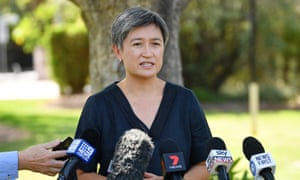Labor senator says those who ‘see political or commercial advantage in heightening cynicism’ are diminishing civic life
Penny Wong
will say that “racism is a threat to our democracy” in a speech taking
aim at those who see “political or commercial advantage” in increased
cynicism towards public institutions.
The Labor senator is set to warn that hate speech and extremist views in parliament and a “lack of unity in response to these” have harmed democracy, pointing the finger in part at the Coalition for its tardy response to condemn One Nation in the 45th parliament.
The intervention comes as Scott Morrison finally agreed on Thursday to the Liberals preferencing Pauline Hanson’s party below Labor, after weeks of mounting pressure relating to One Nation’s rhetoric about migration in the wake of the Christchurch attacks and an al-Jazeera investigation revealing the party sought donations from the National Rifle Association to water down Australia’s gun laws.
Wong makes the comments in speech extracts, seen by Guardian Australia, for the McKinnon oration in Melbourne on Friday. Wong is accepting the McKinnon award naming her political leader of the year alongside Greens senator Jordon Steele-John, who is designated the emerging political leader of the year.
“Racism is not only unethical, it is antithetical to the values which underpin democracy,” Wong says.The Labor senator is set to warn that hate speech and extremist views in parliament and a “lack of unity in response to these” have harmed democracy, pointing the finger in part at the Coalition for its tardy response to condemn One Nation in the 45th parliament.
The intervention comes as Scott Morrison finally agreed on Thursday to the Liberals preferencing Pauline Hanson’s party below Labor, after weeks of mounting pressure relating to One Nation’s rhetoric about migration in the wake of the Christchurch attacks and an al-Jazeera investigation revealing the party sought donations from the National Rifle Association to water down Australia’s gun laws.
Wong makes the comments in speech extracts, seen by Guardian Australia, for the McKinnon oration in Melbourne on Friday. Wong is accepting the McKinnon award naming her political leader of the year alongside Greens senator Jordon Steele-John, who is designated the emerging political leader of the year.
“That is why our rejection of racism, of prejudice, of discrimination and of hate speech must be uncompromising.”
Wong argues that hate speech “cannot be defended on grounds of freedom of speech because it inflicts real and direct harm”, citing the way it works to dehumanise outsiders as “second-class citizens, not deserving the protections and dignity afforded to full members of the community”.
“This is what makes hate speech so dangerous; it is what links hatred in speech to hatred in deed.”
Wong said the “electoral isolation” of Pauline Hanson when she first entered parliament in the 1990s had been a bipartisan effort, as was the “refusal to weaponise community concerns” around the arrival of Indochinese asylum seekers.
“I fear we have done less well this last decade or more,” she says. “The nation is poorer for it and our democracy more fragile.”
Wong says a “good starting point” would be for the Liberal party to commit to preference “extremists like One Nation below the other party of government”.
Polarisation is driven “in part” by political leaders but is also contributed to by “the fragmentation of the news media; the rise of social media; the echo chamber quality of much of our debate; and a failure by many to ground debate within a factual framework”.
Wong says Australia must “face unflinchingly the threat of racism and prejudice, honestly recognise trends towards the normalisation of prejudice and hate speech, and work together to see off these risks”.
“And we must tackle its various drivers – inequality, disrespect, disengagement.”
Wong says the responsibility is “on all leaders, religious, community and political, to stand against those who seek to spread intolerance and hate”.
And she says those who “see political or commercial advantage in heightening cynicism” should consider consequences including degrading the quality of political debate and diminishing civic life.
In the 45th parliament the Coalition has had a patchy record on confronting white nationalism, after government senators voted for a motion that it is “OK to be white” in October only to later claim this was an “administrative error”.
The prime minister, Scott Morrison, himself as shadow immigration minister, reportedly told shadow cabinet in 2011 the Coalition should do more to capitalise on concerns about Muslim immigration, comments which he now denies, claiming he wanted to address rather than exploit those fears.
Earlier in March, Morrison called on Australians to “disagree better” just hours after the home affairs minister, Peter Dutton, accused Greens politicians of being just as bad as Anning.
He said Australians should “reject the thinking that one person’s gain is another’s loss” after stating earlier this month it was “simple math” that medically transferred asylum seekers would take the place of Australian citizen patients in hospitals.
In August the outgoing racial discrimination commissioner Tim Soutphommasane warned that “race politics is back” and criticised Turnbull government ministers for their rhetoric on African gangs and ethnic separatism.
Soutphommasane cited Dutton’s calls for “special attention” for white South African farmers, then citizenship minister Alan Tudge’s claim that Australia is veering towards a “European separatist multicultural model”, and Dutton’s suggestion Melburnians are afraid to go out to dinner due to African youth crime.

No comments:
Post a Comment